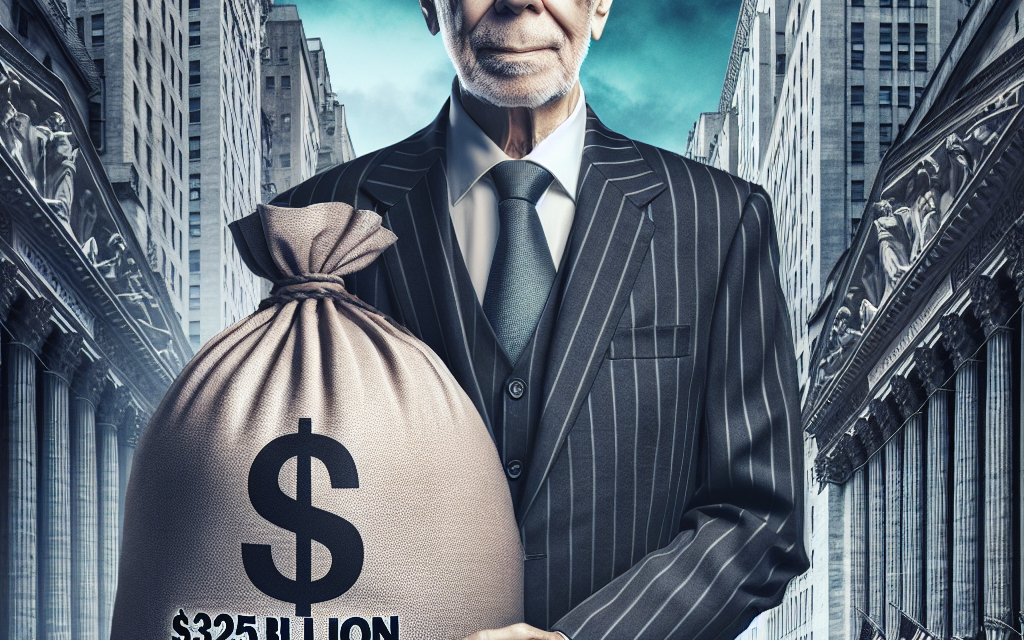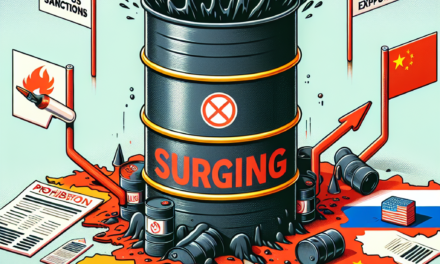“Can Warren Buffett’s $325 Billion Cash Reserve Revitalize Wall Street?”
Introduction
Warren Buffett, the legendary investor and CEO of Berkshire Hathaway, is often viewed as a stabilizing force in the financial markets. With a staggering cash reserve of $325 billion, many analysts are speculating whether Buffett is poised to intervene in Wall Street’s current volatility. This substantial liquidity positions him uniquely to capitalize on market opportunities, potentially providing much-needed support during turbulent times. As economic uncertainties loom, Buffett’s investment strategies and historical track record raise questions about his potential role in rescuing Wall Street and influencing market dynamics. This analysis delves into the implications of his cash reserves and the strategic moves he might consider in the face of market challenges.
Warren Buffett’s Cash Reserve: A Game Changer for Wall Street?
Warren Buffett, the renowned investor and CEO of Berkshire Hathaway, has long been a figure of intrigue and respect in the financial world. His investment strategies and insights have shaped the landscape of Wall Street for decades. Currently, with a staggering cash reserve of approximately $325 billion, many are speculating whether Buffett is poised to play a pivotal role in rescuing Wall Street from its current challenges. This substantial cash reserve not only reflects Buffett’s cautious approach to investing but also positions him as a potential savior in times of economic uncertainty.
As market volatility continues to plague investors, the question arises: how might Buffett leverage this cash reserve to influence the market? Historically, Buffett has demonstrated a knack for identifying undervalued companies, particularly during downturns. His strategy often involves waiting patiently for the right opportunities to present themselves, and with the current economic climate marked by inflationary pressures and geopolitical tensions, many companies may soon find themselves in distress. This scenario could create a fertile ground for Buffett to deploy his cash reserves strategically, acquiring stakes in companies that are fundamentally sound but temporarily undervalued.
Moreover, Buffett’s reputation as a long-term investor adds another layer of intrigue to his potential role in stabilizing Wall Street. Investors often look to Buffett for guidance during turbulent times, and his actions can significantly influence market sentiment. If he were to make substantial investments in struggling sectors, it could instill confidence among other investors, encouraging them to follow suit. This ripple effect could lead to a broader market recovery, as Buffett’s endorsement often serves as a validation of a company’s potential.
In addition to his investment acumen, Buffett’s cash reserve provides him with the flexibility to act quickly when opportunities arise. Unlike many institutional investors who may be constrained by mandates or regulations, Buffett can make decisions based solely on his assessment of value. This agility allows him to capitalize on market inefficiencies that others may overlook. As the economic landscape continues to evolve, this ability to pivot swiftly could prove invaluable in identifying and seizing opportunities that arise from market dislocations.
Furthermore, Buffett’s approach to investing is characterized by a focus on quality and sustainability. He tends to favor companies with strong fundamentals, robust management teams, and competitive advantages. This philosophy not only aligns with his long-term investment strategy but also positions him to contribute positively to the overall health of the market. By investing in companies that are well-managed and poised for growth, Buffett can help foster a more resilient economic environment, ultimately benefiting Wall Street as a whole.
However, it is essential to recognize that while Buffett’s cash reserve presents significant potential, it is not a guaranteed solution to the challenges facing Wall Street. Market dynamics are complex, and external factors can influence outcomes in unpredictable ways. Nevertheless, the prospect of Buffett stepping in as a stabilizing force is an encouraging thought for many investors. His historical track record of navigating economic downturns with strategic investments lends credence to the idea that he could indeed play a crucial role in revitalizing the market.
In conclusion, Warren Buffett’s substantial cash reserve positions him uniquely within the current financial landscape. As he contemplates potential investments, the implications of his decisions could resonate far beyond his own portfolio, potentially serving as a catalyst for broader market recovery. While the future remains uncertain, the prospect of Buffett’s involvement offers a glimmer of hope for those navigating the complexities of Wall Street.
Analyzing Buffett’s Investment Strategies Amid Economic Uncertainty
Warren Buffett, the renowned CEO of Berkshire Hathaway, has long been regarded as one of the most astute investors in the world. His investment strategies, characterized by a disciplined approach and a focus on long-term value, have garnered attention, especially in times of economic uncertainty. As the financial landscape continues to grapple with volatility, many are turning their gaze toward Buffett, particularly in light of his substantial cash reserve, which currently stands at an impressive $325 billion. This significant liquidity positions him uniquely to navigate the complexities of the market and potentially influence Wall Street’s trajectory.
Buffett’s investment philosophy is rooted in the principles of value investing, which emphasizes the importance of purchasing undervalued assets with strong fundamentals. This approach has served him well over the decades, allowing him to identify opportunities that others may overlook. In the current economic climate, characterized by rising interest rates, inflationary pressures, and geopolitical tensions, Buffett’s strategy may be more relevant than ever. His ability to remain patient and disciplined in the face of market fluctuations has often led to substantial gains when the dust settles.
Moreover, Buffett’s cash reserve provides him with a strategic advantage. In times of market distress, when many investors may be paralyzed by fear or uncertainty, Buffett is known for his willingness to act decisively. This readiness to deploy capital can lead to acquiring high-quality companies at discounted prices, a tactic he has employed successfully in the past. For instance, during the 2008 financial crisis, Buffett made significant investments in companies like Goldman Sachs and Bank of America, which ultimately yielded substantial returns as the market recovered. This historical precedent suggests that he may be poised to capitalize on similar opportunities in the current environment.
In addition to his investment acumen, Buffett’s reputation as a stabilizing force in the market cannot be overlooked. His endorsement of a company or sector often instills confidence among investors, leading to increased market activity. As uncertainty looms, the prospect of Buffett stepping in to support struggling industries could provide a much-needed boost to investor sentiment. This phenomenon is particularly relevant in sectors that have been disproportionately affected by recent economic challenges, such as travel, hospitality, and retail.
Furthermore, Buffett’s focus on long-term value rather than short-term gains aligns well with the current economic landscape. Many investors are grappling with the temptation to react impulsively to market fluctuations, but Buffett’s steadfast commitment to fundamental analysis encourages a more measured approach. By emphasizing the importance of understanding a company’s intrinsic value, he advocates for a strategy that prioritizes sustainability over speculation. This perspective is particularly valuable in an era where market sentiment can shift rapidly, often driven by news cycles rather than underlying economic fundamentals.
In conclusion, Warren Buffett’s investment strategies, honed over decades of experience, position him as a potential rescuer for Wall Street amid economic uncertainty. His substantial cash reserve not only allows him to seize opportunities that arise during market downturns but also reinforces his role as a stabilizing influence. As investors look for guidance in these turbulent times, Buffett’s disciplined approach and long-term focus serve as a reminder of the importance of patience and strategic thinking in navigating the complexities of the financial markets. Ultimately, his actions in the coming months may not only shape Berkshire Hathaway’s future but also have far-reaching implications for the broader investment landscape.
The Impact of Buffett’s Cash on Market Stability
Warren Buffett, the renowned investor and CEO of Berkshire Hathaway, has long been a figure of stability and wisdom in the financial world. With a staggering cash reserve of approximately $325 billion, his financial prowess and strategic insights have led many to speculate about the potential impact of his liquidity on market stability. As economic uncertainties loom and market volatility becomes increasingly prevalent, the question arises: could Buffett’s cash reserves serve as a stabilizing force for Wall Street?
To begin with, Buffett’s cash position provides him with a unique advantage in times of market distress. Historically, he has demonstrated a keen ability to identify undervalued assets during downturns, capitalizing on opportunities that others may overlook. This approach not only benefits Berkshire Hathaway but also contributes to broader market stability. When Buffett invests during turbulent times, he often instills confidence in other investors, signaling that there are still viable opportunities in the market. This can lead to a ripple effect, encouraging others to invest and thereby mitigating panic selling.
Moreover, Buffett’s investment philosophy is rooted in long-term value creation rather than short-term speculation. This perspective is particularly crucial during periods of market instability, as it encourages a more measured approach to investing. By focusing on fundamentally sound companies with strong growth potential, Buffett’s actions can help to anchor market sentiment. His willingness to deploy capital in challenging times can serve as a beacon of hope for investors who may be hesitant to enter the market, ultimately fostering a more stable environment.
In addition to his investment strategies, Buffett’s reputation as a prudent and ethical investor further enhances his potential impact on market stability. His long-standing commitment to transparency and integrity has earned him the trust of both individual and institutional investors. When Buffett makes a move, it often garners significant media attention, which can influence market perceptions. As a result, his decisions can sway investor sentiment, leading to increased buying activity and a more stable market atmosphere.
Furthermore, the sheer size of Buffett’s cash reserves means that even a modest investment can have a substantial impact on specific sectors or companies. For instance, if Buffett were to invest a portion of his cash into struggling industries, it could provide much-needed capital and confidence, potentially revitalizing those sectors. This infusion of capital can lead to job preservation, innovation, and overall economic growth, which are essential components of a stable market.
However, it is essential to recognize that while Buffett’s cash reserves present opportunities for market stabilization, they are not a panacea for all economic challenges. Market dynamics are influenced by a myriad of factors, including geopolitical events, interest rates, and consumer behavior. Therefore, while Buffett’s actions can certainly contribute to a more stable environment, they cannot single-handedly resolve systemic issues.
In conclusion, Warren Buffett’s substantial cash reserves position him as a potential stabilizing force in the financial markets. His historical track record of strategic investments during downturns, combined with his reputation for ethical investing, suggests that he could play a pivotal role in restoring confidence among investors. While his cash alone cannot solve all market challenges, it undoubtedly provides a glimmer of hope in uncertain times, reinforcing the notion that even in the face of adversity, there are opportunities for growth and recovery. As investors watch closely, the question remains whether Buffett will seize the moment to deploy his capital and, in doing so, help to stabilize Wall Street.
Historical Precedents: Buffett’s Role in Market Rescues
Warren Buffett, the renowned investor and CEO of Berkshire Hathaway, has long been viewed as a stabilizing force in the tumultuous world of finance. His reputation as a savvy investor is not merely built on his ability to identify undervalued companies; it is also rooted in his historical role during times of economic distress. As we consider the current state of Wall Street, marked by volatility and uncertainty, it is essential to reflect on past instances where Buffett has stepped in to provide much-needed support to the markets.
One of the most notable examples of Buffett’s intervention occurred during the financial crisis of 2008. As the housing market collapsed and financial institutions teetered on the brink of failure, Buffett’s Berkshire Hathaway made headlines by investing $5 billion in Goldman Sachs. This strategic move not only provided the bank with a much-needed capital infusion but also signaled to the market that Buffett had confidence in the institution’s long-term viability. His investment came with a unique twist: it included warrants to purchase additional shares at a predetermined price, allowing Berkshire to benefit from any future recovery. This action not only bolstered Goldman Sachs but also helped restore some level of confidence in the broader financial system.
Moreover, Buffett’s involvement in the American International Group (AIG) during the same crisis further exemplifies his role as a market rescuer. In 2008, AIG faced severe liquidity issues, threatening its existence and, by extension, the stability of the global financial system. Buffett stepped in with a $3 billion investment, which provided the insurance giant with the necessary capital to navigate its challenges. This intervention not only helped AIG stabilize but also demonstrated Buffett’s willingness to take calculated risks in times of crisis, reinforcing his image as a financial savior.
Transitioning from these historical precedents, it is crucial to consider the current context in which Buffett finds himself. With a staggering cash reserve of approximately $325 billion, Berkshire Hathaway is in a unique position to influence the market once again. This substantial liquidity provides Buffett with the flexibility to act decisively should opportunities arise, particularly in a climate where many companies may be struggling due to economic headwinds. The potential for Buffett to deploy this capital in a manner similar to his past interventions raises questions about whether he will once again emerge as a stabilizing force.
Furthermore, the current economic landscape is characterized by rising interest rates, inflationary pressures, and geopolitical uncertainties, all of which contribute to market volatility. In such an environment, Buffett’s historical approach of seeking value in distressed assets could lead him to identify opportunities that others may overlook. His long-term investment philosophy, coupled with his substantial cash reserves, positions him well to make strategic acquisitions that could not only benefit Berkshire Hathaway but also provide a much-needed boost to the broader market.
In conclusion, Warren Buffett’s historical precedents as a market rescuer highlight his ability to navigate financial crises with a level of foresight and confidence that few possess. As we observe the current economic landscape, the question remains whether Buffett will once again take on the mantle of a financial savior. With his significant cash reserves at his disposal, the potential for him to intervene in a meaningful way exists, and the implications of such actions could reverberate throughout Wall Street, offering hope in uncertain times.
What Buffett’s Cash Reserve Means for Investors
Warren Buffett, the renowned CEO of Berkshire Hathaway, has long been a beacon of wisdom in the investment community. His investment philosophy, characterized by value investing and a long-term perspective, has garnered him a reputation as one of the most successful investors of all time. As of late, Buffett’s cash reserve, which has ballooned to an impressive $325 billion, has sparked discussions among investors regarding its implications for the broader market. This substantial cash reserve not only reflects Buffett’s cautious approach but also signals potential opportunities for investors navigating an uncertain economic landscape.
To begin with, the sheer size of Buffett’s cash reserve indicates a strategic positioning in anticipation of market fluctuations. In times of economic uncertainty, having liquidity allows for flexibility and the ability to capitalize on undervalued assets. Investors often look to Buffett as a barometer for market sentiment, and his current cash holdings suggest that he may be waiting for the right moment to deploy capital. This could mean that he is anticipating a market correction or a downturn, which could present buying opportunities for those who are prepared. Consequently, investors should consider the implications of Buffett’s cash reserve as a signal to remain vigilant and ready to act when favorable conditions arise.
Moreover, Buffett’s cash reserve can be interpreted as a reflection of his assessment of current market valuations. With many sectors experiencing inflated prices, Buffett’s reluctance to invest heavily in the stock market may indicate that he perceives a disconnect between asset prices and intrinsic value. This perspective encourages investors to conduct thorough analyses of their portfolios and to be discerning in their investment choices. By adopting a value-oriented approach, investors can align themselves with Buffett’s philosophy, focusing on long-term growth rather than short-term gains.
In addition, Buffett’s cash reserve serves as a reminder of the importance of maintaining a diversified portfolio. While it may be tempting to chase high-flying stocks or trends, Buffett’s strategy emphasizes the need for a balanced approach that includes cash reserves. This diversification not only mitigates risk but also positions investors to take advantage of opportunities as they arise. As Buffett himself has demonstrated, having cash on hand can be a powerful tool in times of market volatility, allowing investors to seize opportunities that others may overlook.
Furthermore, the implications of Buffett’s cash reserve extend beyond individual investors to the broader market. Should Buffett decide to deploy a portion of his cash into strategic acquisitions or investments, it could have a ripple effect, instilling confidence in other investors and potentially stabilizing market sentiment. The prospect of Buffett entering the market with significant capital could encourage other investors to follow suit, leading to a resurgence in buying activity. This collective movement could help to counteract bearish trends and foster a more optimistic outlook for the market.
In conclusion, Warren Buffett’s substantial cash reserve of $325 billion carries significant implications for investors. It serves as a reminder of the importance of liquidity, a signal to remain vigilant in the face of market uncertainties, and an encouragement to adopt a value-oriented investment strategy. As investors reflect on Buffett’s approach, they may find that his cash reserve not only represents a strategic positioning but also offers insights into navigating the complexities of the current financial landscape. Ultimately, by aligning with Buffett’s principles, investors can better prepare themselves for the opportunities that lie ahead.
The Future of Wall Street: Can Buffett Lead the Way?
As Wall Street grapples with uncertainty and volatility, the question arises: can Warren Buffett, the Oracle of Omaha, leverage his substantial cash reserves to steer the financial markets toward stability and growth? With a staggering $325 billion in cash at his disposal, Buffett’s financial acumen and strategic foresight could play a pivotal role in shaping the future of Wall Street. His investment philosophy, characterized by a long-term perspective and a focus on intrinsic value, positions him uniquely to navigate the complexities of the current economic landscape.
In recent years, Wall Street has faced numerous challenges, including inflationary pressures, geopolitical tensions, and shifting consumer behaviors. These factors have contributed to market fluctuations that have left many investors feeling anxious and uncertain about the future. Amidst this backdrop, Buffett’s cash reserve stands out as a beacon of potential. His ability to identify undervalued assets and invest in companies with strong fundamentals could provide much-needed support to struggling sectors. By deploying his capital strategically, Buffett could not only enhance the performance of his own portfolio but also instill confidence in the broader market.
Moreover, Buffett’s reputation as a prudent investor lends credibility to his actions. When he makes a move, it often signals to the market that there is value to be found, encouraging other investors to follow suit. This phenomenon, known as the “Buffett effect,” could amplify the impact of his investments, creating a ripple effect that revitalizes confidence across Wall Street. As he has demonstrated in the past, Buffett is not afraid to invest during downturns, recognizing that market corrections often present unique opportunities for long-term gains.
Transitioning from his historical investment strategies to the current economic climate, it is essential to consider how Buffett’s approach may evolve. While he has traditionally favored established companies with strong cash flows, the rapid pace of technological advancement and the rise of innovative startups may prompt him to explore new avenues. Investing in sectors such as renewable energy, biotechnology, and artificial intelligence could not only diversify his portfolio but also align with broader societal trends toward sustainability and technological integration. By embracing these emerging industries, Buffett could position himself as a forward-thinking leader, guiding Wall Street into a new era of growth.
Furthermore, Buffett’s influence extends beyond mere financial transactions; his leadership style and ethical approach to business resonate with many investors. In an age where corporate governance and social responsibility are increasingly scrutinized, Buffett’s commitment to transparency and integrity sets a standard for others to follow. His potential to advocate for responsible investing practices could foster a culture of accountability on Wall Street, encouraging companies to prioritize long-term value creation over short-term gains.
In conclusion, while the future of Wall Street remains uncertain, Warren Buffett’s substantial cash reserves and proven investment strategies position him as a potential catalyst for change. By leveraging his financial resources and influence, he could not only identify lucrative opportunities but also inspire confidence among investors. As the market continues to navigate its challenges, Buffett’s leadership may very well be the guiding force that helps Wall Street regain its footing and embark on a path toward sustainable growth. Ultimately, the question is not merely whether Buffett can rescue Wall Street, but rather how his actions will shape the financial landscape for years to come.
Lessons from Buffett: Navigating Financial Crises with Cash Reserves
Warren Buffett, the renowned investor and CEO of Berkshire Hathaway, has long been a beacon of wisdom in the financial world. His investment philosophy, characterized by a focus on value and a long-term perspective, has garnered him a reputation as one of the most successful investors of all time. As Wall Street faces increasing volatility and uncertainty, many are turning their attention to Buffett’s substantial cash reserves, which currently stand at an impressive $325 billion. This significant liquidity positions him uniquely to navigate potential financial crises, offering valuable lessons for both individual investors and institutional players alike.
One of the most critical lessons from Buffett’s approach is the importance of maintaining a robust cash reserve. In times of economic turmoil, having liquid assets allows investors to seize opportunities that others may overlook. Buffett has consistently emphasized that cash is not merely a safety net; it is a tool for strategic investment. When markets are down, and fear prevails, Buffett has historically been able to acquire undervalued assets, thereby positioning himself for substantial gains when the market rebounds. This strategy underscores the idea that financial crises can also present unique opportunities for those who are prepared.
Moreover, Buffett’s cash reserves serve as a buffer against market fluctuations. During periods of economic distress, many investors panic and sell off their holdings, often at a loss. In contrast, Buffett’s liquidity allows him to remain calm and collected, enabling him to make informed decisions rather than reactive ones. This disciplined approach is a testament to the value of patience and strategic thinking in investing. By resisting the urge to follow the crowd, Buffett exemplifies how a well-capitalized investor can navigate turbulent waters with confidence.
Additionally, Buffett’s cash reserves provide him with the flexibility to support his portfolio companies during challenging times. In the past, he has stepped in to provide financial assistance to businesses within his conglomerate, ensuring their stability and long-term viability. This proactive approach not only reinforces his commitment to his investments but also fosters loyalty and trust among the companies he supports. As a result, Buffett’s ability to leverage his cash reserves extends beyond mere opportunistic buying; it encompasses a broader strategy of nurturing and sustaining the businesses that contribute to his overall success.
Furthermore, Buffett’s emphasis on cash reserves highlights the importance of risk management in investing. By maintaining a significant amount of liquid assets, he mitigates the risks associated with market downturns. This principle is particularly relevant in today’s economic climate, where uncertainty looms large. Investors who prioritize cash reserves can better weather financial storms, ensuring they are not forced to sell assets at unfavorable prices. In this way, Buffett’s approach serves as a reminder that prudent financial management is essential for long-term success.
In conclusion, Warren Buffett’s substantial cash reserves provide invaluable insights into navigating financial crises. His ability to leverage liquidity for strategic investments, maintain composure during market volatility, support portfolio companies, and manage risk effectively underscores the importance of cash in an investor’s toolkit. As Wall Street grapples with uncertainty, Buffett’s approach serves as a guiding light, illustrating that preparedness and strategic thinking can turn challenges into opportunities. By learning from Buffett’s example, investors can better position themselves to thrive in an ever-changing financial landscape.
Q&A
1. **Question:** What is the significance of Warren Buffett’s $325 billion cash reserve?
**Answer:** The cash reserve positions Buffett to make significant investments or acquisitions, potentially stabilizing or revitalizing Wall Street during economic downturns.
2. **Question:** How might Buffett’s investment strategy impact market confidence?
**Answer:** Buffett’s involvement could boost investor confidence, as his track record suggests he invests wisely, which may encourage others to invest as well.
3. **Question:** What sectors might Buffett target with his cash reserve?
**Answer:** Buffett may focus on undervalued sectors such as technology, financials, or consumer goods, which could benefit from his investment.
4. **Question:** How does Buffett’s approach differ from other investors during market volatility?
**Answer:** Buffett typically adopts a long-term value investing approach, while others may react more emotionally or short-term focused during volatility.
5. **Question:** What historical examples illustrate Buffett’s role in market recovery?
**Answer:** Buffett has previously stepped in during crises, such as the 2008 financial crisis, where he invested in Goldman Sachs and Bank of America, helping to stabilize those firms.
6. **Question:** What are the potential risks of Buffett’s large cash reserve?
**Answer:** Holding a large cash reserve may lead to missed opportunities if the market rebounds quickly, and investing in the wrong sectors could result in significant losses.
7. **Question:** Could Buffett’s actions influence regulatory changes on Wall Street?
**Answer:** Yes, if Buffett’s investments lead to significant market shifts, it could prompt regulators to reassess policies affecting large investments and market stability.
Conclusion
Warren Buffett’s substantial cash reserve of $325 billion positions him as a potential stabilizing force for Wall Street during economic downturns. His investment strategy, characterized by value buying and long-term perspectives, suggests that he could capitalize on market volatility to acquire undervalued assets. However, while Buffett’s involvement could instill confidence and provide liquidity, the broader market dynamics and external economic factors will ultimately determine the extent of his impact. Thus, while he may play a significant role, he is not a guaranteed savior for Wall Street.





